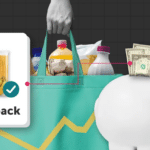
Were your grocery shopping habits a little… unusual last year? Probably so. The question now, is whether a new year will represent a return to our old ways.
Several new reports have shown just how out-of-the-ordinary our shopping and spending were last year, largely due to the coronavirus pandemic disrupting our usual ways. Whether it was due to fewer in-person shopping trips, more out-of-stocks, personal financial constraints or sheer boredom, 2020 was the year our usually reliably routine shopping habits were completely upended.
A survey conducted by Travis Credit Union found that half of respondents cut back on their spending last year, citing financial uncertainty, job losses or the simple fact that there were fewer opportunities for them to spend, with travel and dining out largely off the table.
Then again, “not everyone is being more careful with his money,” TCU found. A third of respondents said they spent more than usual last year, with most reporting increased expenditures on household supplies, entertainment and groceries. And then there’s “doom spending.” Half of respondents admitted to spending more money due to stress, anxiety or boredom.
That’s similar to what Ibotta found in its own review of 2020 spending habits. “After looking at millions of 2020 shopper receipts, Ibotta found that consumers treated themselves like never before to make it through an absolutely brutal 2020,” the cash-back app said in announcing its findings.
Ibotta’s data found that more shoppers indulged themselves with the purchase of treats, buying 33% more desserts, 16% more cheese, 24% more bath and body care products and 53% more pie filling than they did in 2019, while sales of all types of alcohol were up as well. Altogether, between April and December 2020, the average grocery transaction was 10% larger than during the same time frame the previous year.
The grocery chain Stop & Shop says its shoppers had their own favorites over the past year. It’s no surprise that toilet paper, paper towels and household cleaners sold better in 2020 than in 2019. But fresh meat, seafood and frozen foods also sold well, as more people cooked at home, while sales of healthier items like hummus, tofu and veggie meat substitutes rose – indicating that not everyone spent the pandemic indulging in junk food. Surprise hot sellers included flowers and balloons, which shoppers bought to liven up housebound celebrations.
Other changes from 2019 are a decrease in sales of cold remedies, likely due to mask-wearing and fewer in-person gatherings. And, “the decrease in social interactions has also decreased the sale of gum and breath mints,” Stop & Shop said. So consider it a good thing, in more ways than one, if people you come into close contact with are wearing a mask.
So what will 2021 bring? Ibotta says January typically sees shoppers spending less and making better eating choices. “Of course, while January brings the requisite resolution setting, Ibotta recognizes that for some, scaling back is the last thing on their mind after a hard year,” Ibotta noted. Already, its data has found that the average transaction for January has been larger than usual.
With vaccines rolling out, everyone hopes 2021 will be the year when life returns to normal. And if you’ve been spending more than usual over the past year – a return to normal might be particularly welcome news, in more ways than one.
Image source: Flickr/jjbers










